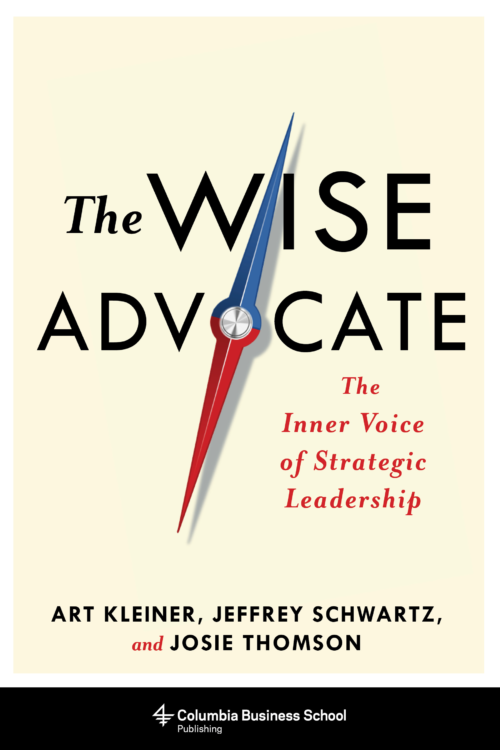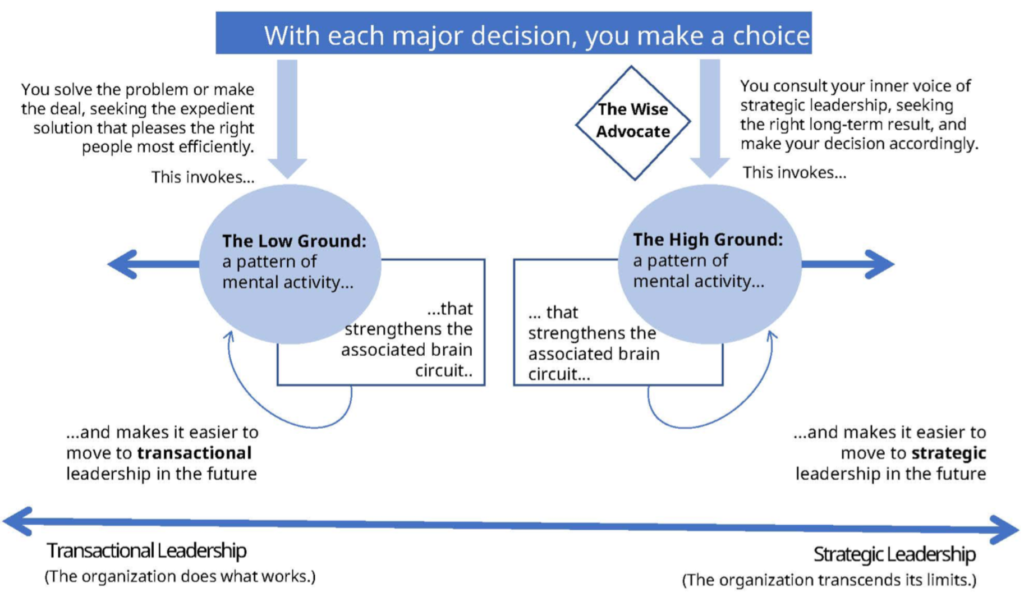Leading from the High Road Less Travelled
Four Steps to Wise Leadership
Have you ever wondered what makes a good leader – the type of leader that naturally elicits results, trust, respect and commitment? What does it take to be more than a transactional leader… to become a transformational leader?

This book, to be published by Columbia University Press this September, describes a new understanding of the relationship between the mindful activity of a leader and the presence of that individual in an organisation.
Essentially, we explore how leaders can transcend limits by moving from a “low road” pattern to a “high road” pattern within their mind and retraining the associated brain circuits and organisational systems.
As a leader, how do you develop the habit of making better choices, time and time again, even in difficult and uncertain circumstances?
You focus your attention in moments of choice.
Ordinary decision makers take the “low road,” focusing on what people want and solving problems as rapidly and efficiently as possible. But some very capable leaders follow the “high road” – a focusing on who they are, who others are, and what is best for the whole system in the long run. This is experienced as calling on a Wise Advocate within your mind, and over time, as you cultivate this perspective, you learn to play a similar Wise Advocate role in the larger organisation you operate within.
The Low Road is valuable in business, but only the High Road can move you past the self-imposed barriers that block your greatest aspirations. These two patterns of mental activity are associated with different parts of the medial prefrontal cortex: the dorsal (higher) part for the High Road and the ventral (lower) part for the Low Road. If the wise leadership hypothesis is true (i.e. it is consistent with neuroscience, psychology, organisational research, and ethics), then the quality and effectiveness of your leadership depends on your ability to move to the High Road.

Two habitual practices can help: mindfulness (becoming more aware of your mental activity) and mentalising (thinking about what others are thinking and likely to do).
The book takes you through a four-step process for moving to the High Road and embracing the Wise Advocate perspective: 1) Relabeling the deceptive messages that travel on the low road, so you can see them, in the moment, for what they are; 2) Reframing them with more effective guidance; 3) Refocusing your attention so that movement to the High Road becomes habitual; and 4) Revaluing your role and action in the larger enterprise.
What’s particularly exciting about this book is it shows how to move between the two paths of leadership competence – the high road and the low road. It also advises leaders on how to potentially replicate the Wise Advocate within their own mind, to their role within their organization. The four steps provide a consistently available way to improve one’s transformational competence, and it shows how core groups can be effectively influenced to also operate on the High Road less travelled too.
So, there you have it. We’ve explored how you can move from transactional leadership to transformational leadership by adopting your own Wise Advocate on the High Road less travelled.
My co-authors and myself will be available for presentations and workshops for organisations interested in exploring ways to cultivate Wise Advocate leadership. There will also be opportunity to license our programs soon (set up an EOI form please for presentation/workshop, book, licensing options to select from, then leave their name, and email address, and maybe a free form field for other comments?). You can also check out my other offerings over on my website at josiethomson.com.
Feedback is the meal of champions and I love to eat! Please share your thoughts below about leadership and ideals you have about transformational and transactional leadership strategies.
Until next time remember: it’s not what happens to you that defines you, it’s how you respond that counts.
Shine on!

Enlivened Teams, Resilient Workplaces
Whether it is a critical workplace event or project, dealing with the constant and rapid pace of change, or simply responding to the day-to-day challenging situations that we all encounter, personal resilience is the determining factor in who fails and who succeeds.
Build a resilient workplace by training managers in how to cultivate their own and others’ resilience so they know that when the going gets tough, they can lead with true grit.
If you are interested in finding out more, click here.
You Are Not Your Brain
You CAN change the way you think, and gradually and sustainably master a new way to be and live.
And that’s exactly why Dr Jeffrey M. Schwartz and I created a highly effective self-paced on-line program based on his best selling book: You Are Not Your Brain webinar series.
If you are grappling with navigating change, know that you are not alone. Many of us are right there with you, working hard to feel better, think more clearly, and get our lives well and truly on track.
This is precisely why we built the You Are Not Your Brain online course which is filled with practical neuroscience and time-tested steps on how to support you to manage change more effectively and adaptively.
This is not an online ebook that you can read and forget about. It’s a revolutionary, self-paced online course and community with 8 video lessons, and many time-tested brain-based strategies and techniques that will teach you step by step, scientifically proven methods for changing bad habits, ending unhealthy thinking, and take back control of your life and happiness. These are the exact proven strategies and techniques I have used in my coaching practice to help thousands of people over the past two decades.
If you know anyone who could benefit from this blog post about Change, or the You Are Not Your Brain online program, please share and help spread the love.
Want to see how you stack on the Resilience Scale? Sign up and take my complimentary self assessment here.


Timely blog. It helped put in perspective what is frustrating and diasappointing in the current situation.
I’m glad it’s useful Maria. The key is awareness. When you pay attention to what you’re paying attention to, you can elevate, clarify and expand your focus to make better decisions for the long term. Very best wishes to you.